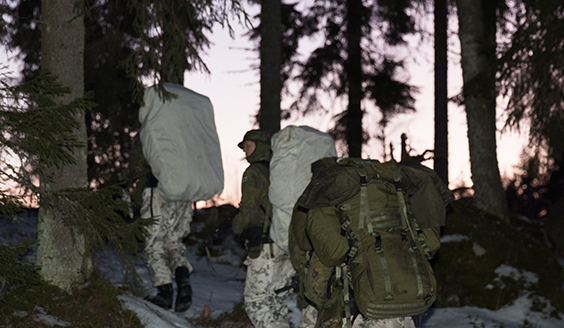Athletes being trained in reconnaissance due to their physical and mental aptitude

The Finnish Defence Forces' Sports School trains reconnaissance sections for exceptional circumstances. Most athletes complete leadership training, serving for 347 days.
Training athletes in reconnaissance is a Finnish tradition stretching back to the second World War. Becoming a reconnaissance specialist requires excellent physical and mental capabilities, which are precisely the attributes developed by goal-oriented training and competition in professional-level sports. Furthermore, the physical capabilities of athletes remain high for longer than average, even after conscript service.
The training level of conscripts enrolled in the Sports School is evaluated with the same tests and indicators as that of other Finnish conscripts. Last week, summer sports athletes completed their training branch qualification test for reconnaissance specialists. In addition to the test, the training branch qualification also includes a number of theory tests.
The training branch qualification test, lasting throughout the night from Tuesday afternoon to Wednesday morning, was held in Hollola. The purpose of the test is to measure the reconnaissance and survival skills of individual combatants.
"Winter conditions always place an additional strain on reconnaissance specialists. The goal of the demanding training branch qualification test is to not only measure skills and physical capability, but also test how well the reconnaissance specialists can maintain their operational capability in demanding conditions," explained the commander of the Reconnaissance Company, Captain Ohto Oksanen
Reconnaissance specialists carry all of their equipment with them. In additional to personal equipment, a reconnaissance section also carries a low guerrilla tent and stove. Firewood is gathered from the forest, and both drinking water and food are carried by the troops themselves and prepared by using portable stoves.
Reconnaissance operations typically require specialists to remain isolated from other friendly troops, sometimes even for extended periods of time, which sets special requirements for mental capability as well.

Leadership training and demanding reconnaissance section firing
In mid-January, the conscripts of the Sports School practiced the operations of a reconnaissance patrol and section with live rounds in Pahkajärvi. The firing exercise involved both summer and winter sports athletes. During the demanding reconnaissance firing exercises, the troops also trained in operating procedures for raids, road crossings and disengagement from observation positions that have been revealed to the enemy, in both light and dark conditions.
"The most demanding firing exercise of the week was the impact firing of the winter sports contingent, which is due to muster out in March. In this exercise, a reconnaissance section destroyed an enemy command post by using recoilless rifles, sniper rifles and indirect fire, and then disengaged from the location, while in combat. During the disengagement, the troops also practiced evacuating wounded whilst under fire," evaluated Captain Ohto Oksanen.
Approximately one third of the Sports School's conscripts are trained in rank duties, to serve reconnaissance sections as reconnaissance specialists or the Reconnaissance Company as combat messengers, for example.
Over a half of the Sports School's conscripts are trained as NCOs. In the NCO course, each athlete is trained in one of the specialisations of a reconnaissance section. These specialisations include the duties of sniper NCO, reconnaissance fire control NCO, radio operator NCO and reconnaissance medic NCO.
Furthermore, approximately 15% of the Sports School's contingent are trained as reserve officers in the battalion-level unit's own reserve officer course. These athletes muster out primarily as second lieutenants, and are assigned to reconnaissance sections as section leaders, section deputy leaders or reconnaissance forward observers. In addition to this, some athletes from each contingent are trained as platoon leaders and reconnaissance officers.
The Sports School is part of the Finnish coaching system
Sports school operations are managed by the Finnish Defence Forces' Sports School, which is a battalion-level unit of the Guard Jaeger Regiment, in addition to being the Finnish Defence Forces' Centre of Expertise in the field of sports and military sport coaching centre. The Kainuu Brigade located in Kajaani is the service location for athletes specialising in the following winter spots: biathlon, orienteering on skis, snowboarding, cross-country skiing, ski jump and Nordic combined. Sports school operations combine the military service of the top athletes of the age group with professional level coaching.
Sports school operations support the goals and objectives of the national professional sport system in a way that is consistent with the duties of the Finnish Defence Forces. Sports school operations are developed in close cooperation with the Professional Sports Unit of Finland's National Olympic Committee, sports federations, clubs and personal coaches.
Daily coaching is conducted in collaboration with Pääkaupunkiseudun Urheiluakatemia and Vuokatti-Ruka Sports Academy. The application period for the new summers sports contingent ends on 1 June 2017, while the application period for the winter sports contingent ends on 1 January 2018.



